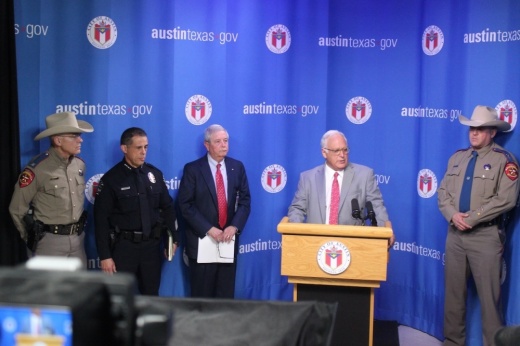The scope of the joint operation between Texas and the Austin Police Department was still being worked out as of its announcement March 27, but police Chief Joseph Chacon said he expects increased DPS patrols in Austin will begin in a matter of days. Gov. Greg Abbott said he was directing DPS assistance to Austin following local leaders' announcement of the plan.
The program has no definite end date and comes at no cost to Austin.
City leaders said the infusion of state support is needed at this time given the longtime staffing shortage at the APD, which Mayor Kirk Watson labeled as an "unprecedented" challenge, and mounting worries over local crime and traffic safety. Watson said the DPS support plan developed organically after recent discussions with Lt. Gov. Dan Patrick.
“It’s a common-sense, practical response to a serious need, and it arose out of a positive working relationship between the capital city and the capitol of Texas that will benefit our shared constituents," Watson said at a March 27 press conference.
The Austin initiative is not the first time state DPS troopers have stepped in to address local crime concerns, with officials noting similar past operations in Dallas and San Antonio. City officials also referenced the state law enforcement agency's recent work with APD in response to February's "street takeovers" throughout the city.
Watson's work with state leaders to roll out the new DPS initiative came soon after an internal leadership change related to police oversight. Interim City Manager Jesús Garza announced in early March the retirement of former Assistant City Manager Rey Arellano, who oversaw public safety departments, and that former APD Assistant Chief Bruce Mills would be serving in that role.
APD's staffing rate currently sits around 84% with 291 vacancies out of 1,812 budgeted officers. Police staffing rates have gradually declined over the past five years from a high of 96% in April 2018, when 1,835 of 1,908 budgeted officer positions were filled, according to APD records.
Austin police have reported 21 homicides and 24 traffic deaths so far in 2023, both of which slightly outpace 2022 as of late March. After reaching recent peaks in 2020 and 2021, violent crime including homicides dropped slightly in 2022 alongside declines in robberies and burglaries, while auto thefts jumped up.
Operation details
Chacon said issues including rising police response times, less proactive policing in the community, and increasing gun crimes and traffic deaths are linked to short-staffing at APD, and that he is excited for the DPS operation to begin.
“This is a good day. As we have had the challenges that I’ve been talking about at the Austin Police Department for really the last couple of years, this is a major step forward in increasing public safety," Chacon said.
Even once it is underway, Chacon said he still expects APD officers will respond to a majority of 911 calls in the city while state troopers focus specifically on traffic enforcement and targeted crimes. He also said the program will be data-driven, and that APD and DPS are developing a plan to ensure the agencies communicate effectively.
"This is support and supplement. Not override, not overtake," Watson said.
Officials March 27 declined to share the number of state troopers and special agents that will be involved, or where and when they will patrol the city.
"You'll certainly see a large number of these uniforms around town. And there'll be other DPS officers you won't be seeing," DPS Director Steven McCraw said.
Separate from the new initiative, city leaders also said their internal push to staff up APD will continue with ongoing cadet academy classes and newly approved incentives to attract officers to the force.
Policing in focus
Officials announced the new public safety initiative weeks after more contentious local policy moves related to APD, ahead of a May election over police oversight and following years of community discussion over policing in Austin.
City leaders March 27 said APD's staffing situation was brought on in part by City Council's 2019 decision to put a hold on any new police academy classes, pausing any new additions to the force. That council vote prompted broader reviews of APD training, culture and operations that stemmed in part from past reports of disproportionate policing, allegations of a toxic environment at the police academy and a whistleblower complaint alleging racism by an assistant police chief.
Third-party evaluation of the police department is continuing, most recently with a report on the lacking effectiveness of community oversight reforms at APD's academy.
Council in recent years has taken up other controversial votes related to policing ranging from the reallocation of millions of dollars from the department's budget in 2020 to this year's handling of labor negotiations with the Austin Police Association.
Austin voters also had the chance to weigh in on police staffing in 2021, when a ballot measure that would have set a permanent officer-to-resident ratio failed with more than 68% opposition.





